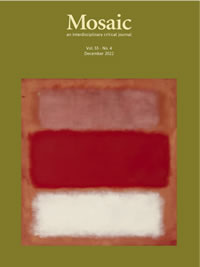Issue 55.4
Overview

General Issue
Published: December 2022
View the issue introduction or see the issue summary and contents below.
8 essays, totalling 176 pages
$24.95 CAD
Featuring the art of Mark Rothko, this general issue publishes essays on necrology, the image of stray dogs in war literature, Canadian electronic literature, David Foster Wallace, Arundhati Roy, Xi Xi, affect and tropisms, and Sylvain Tesson.
Name Us: Necrology as Elegiac Resistance in the U.S.-Mexico BorderlandsAllison Fagan On the U.S.-Mexico border, thousands of migrant dead go unidentified, unnamed. Situating works of twenty-first-century photography, journalism, documentary, and creative nonfiction at the intersection of necrology and elegy, I argue that these narrative searches for names both illuminate and resist the necropolitical border policies designed to anonymize and erase. | |
Stray Dogs and Grievability in Iraq War LiteratureIci Vanwesenbeeck This essay argues that the recurrent image of stray dogs in U.S. veterans’ Iraq War literature reveals a neo-colonialist ethos that buttresses and expands existing stereotypes of the Orient as a lawless place in need of Western order. Examining how the image of the cannibalistic, transgressive, enemy canine is grafted onto the already existing ideologeme of Iraq as an inferior Muslim, Arab country, the essay asks why the stray dog appears in these texts as a creature that is routinely shot at but cannot be grieved. | |
Digital Language Objects in and out of CanadaSean Braune This essay will consider select instances of electronic literature to develop a provisional hermeneutics of digital objects. The primary goal of this essay is to discuss electronic literature in relation to the questions “what is a digital object?” and “what is a digital text?” | |
Spirals and Circles: Self-Help in David Foster Wallace’s The Pale KingShuyu Lee The essay argues that in David Foster Wallace’s The Pale King, self-help exacerbates, if not causes, mental dis-tress in a neoliberal society of self-entrepreneurial competition. Resistance to self-help, the novel suggests, lies in a combination of radical ignorance and other-directed attention. | |
Witness and Withness: Trauma and the Language of Matter in The God of Small ThingsKarine Hack Braiding new materialism, postcolonial theory, and trauma theory, this essay reads Arundhati Roy’s The God of Small Things as a more-than-human landscape of solidarity wherein subaltern humans and things bear embodied and active witness. These networks subvert the powers of oppressive systems, allowing for alternate conceptions of agency, repair, and language. | |
The Value Theory of Labour: Xi Xi, Teddy Bears, and World LiteratureJeffrey Clapp and Chen Yanyi The renowned Hong Kong author Xi Xi wrote about handcraft for decades, and emerged as a “teddy bear artist” in a late phase of her career. In dialogue with Richard Sennett’s craft-based ethics and politics, we develop an approach to Xi Xi’s art and writing that connects both to theorizations of world literature. | |
Philosophy of Affect and Literature of Tropisms: A Spectrum PerspectiveMagdalena Sawa Studying Brian Massumi’s philosophy of affect alongside Nathalie Sarraute’s theory of tropisms and its literary application in Tropisms (1939) exposes Massumi’s enigmatic affectivity as a travelling potential and points to a more comprehensive understanding of affect—as an element of a spectrum rather than a separate entity clearly contrasted with emotions. | |
The Biosemiosic, Derridean Gaze of the ‘Wholly Other’ in Sylvain Tesson’s ‘Les porcs’Keith Moser Adopting a Derridean approach, this essay investigates the force of the biosemiosic gaze of the “wholly other” in Sylvain Tesson’s “Les porcs.” Derrida’s and Tesson’s extension of Levinasian ethics open the door to interspecific compassion through the deconstruction of anthropocentric arguments barring other species from admission into the moral community. |